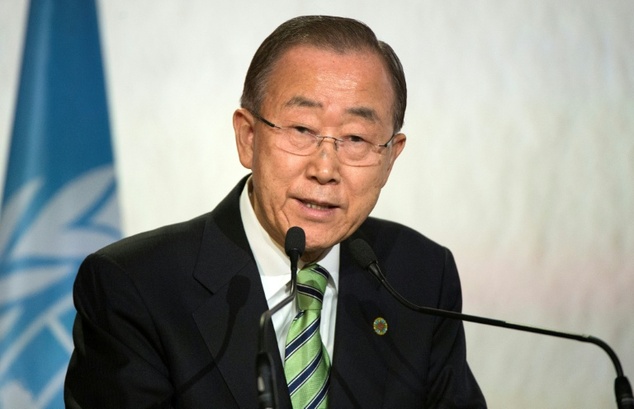Post-Impeachment South Korean Presidential race begins
(VNF) - The impeachment of South Korean President Park Geun-Hye has set off an early scramble among her potential successors, even before the final decision has been made to remove her from office.
On paper, the next presidential election is still slated for December 2017, but Park's impeachment could see it held much earlier.
Last week's parliamentary vote to oust her needs to be ratified by the Constitutional Court -- a process that could take six months, although most observers believe the judgment will come sooner.
If the justices confirm impeachment, Park will be permanently removed and elections must be held within 60 days -- meaning a ballot could be held as early as March.
That isn't necessarily good news for the one front runner who still hasn't openly declared an interest in the race – U.N. Secretary General Ban Ki-Moon.
 |
Outgoing United Nations Secretary-General Ban Ki-moon still hasn't openly declared an interest in the race (Photo: FADEL SENNA/AFP/File)
Until recently, Ban regularly topped opinion polls and was widely expected to run as the nominee of Park's ruling conservative Saenuri Party.
Now, with other candidates already out of the starting blocks, Ban is hamstrung by the fact that he doesn't step down as U.N. chief until the end of this year.
In his last press briefing as secretary general on Friday (Dec. 16th), the 72-year-old said he would return to South Korea and "consider seriously" how best to serve his country.
Problematically for Ban, the political upheaval has ripped the Saenuri Party apart, leaving him without an obvious platform to launch and run his campaign.
Since the start of the current crisis, Ban has ceded his spot atop the opinion polls to Moon Jae-In, the former leader of the main opposition Democratic Party who narrowly lost to Park in the 2012 elections.
A former chief of staff to the late liberal president Roh Moo-Hyun, Moon advocates forcing reforms on the South's all-powerful conglomerates and a policy of engagement with North Korea over its nuclear weapons programme.
Moon has stopped short of declaring his candidacy, but organised a rare press briefing with foreign correspondents in Seoul last week and said what a "huge honour" it would be to run in the next election.
He also flagged some key policy changes he might implement, including reconsidering the deployment of an advanced U.S. missile defence system to cope with North Korean threats.
"Once the court makes the ruling, we have to pick a new president in 60 days," said Kang Sun-A, deputy spokeswoman for the Democratic Party.
"The elections will happen at least six months earlier than scheduled so the candidates have no choice but to prepare," Kang told AFP.
A recent Gallup poll showed the liberal mayor of Seongnam city, Lee Jae-Myung with 18 percent support, close to Moon and Ban and a leap of 13 percentage points from a pre-crisis poll conducted in October.
Unlike the other presumed contenders, Lee has declared his intention to run and has already started disparaging his likely rivals.
Asked to evaluate Ban's candidacy in a recent interview, Lee said his own experience as a local official dealing with local issues carried more weight than heading the United Nations./.
( Compiled by VNF )
Recommended
 World
World
US, China Conclude Trade Talks with Positive Outcome
 World
World
Nifty, Sensex jumped more than 2% in opening as India-Pakistan tensions ease
 World
World
Easing of US-China Tariffs: Markets React Positively, Experts Remain Cautious
 World
World
India strikes back at terrorists with Operation Sindoor
Popular article
 World
World
India sending Holy Relics of Lord Buddha to Vietnam a special gesture, has generated tremendous spiritual faith: Kiren Rijiju
 World
World
Why the India-US Sonobuoy Co-Production Agreement Matters
 World
World
Vietnam’s 50-year Reunification Celebration Garners Argentine Press’s Attention
 World
World



